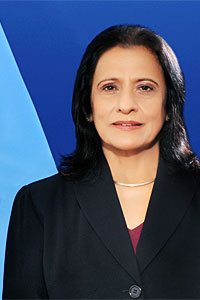Thailand's elimination of mother-to-child HIV transmission will help end the country's ongoing epidemic, and signifies the importance of realising universal health coverage.
Thailand is proving itself a leader in the global battle to end paediatric Aids and in the ongoing struggle to enhance health care coverage. This week, the World Health Organisation has formally declared Thailand as having eliminated new HIV infections among children -- an achievement that was facilitated by enhancing health care equity and ensuring no one is left behind.
The numbers are impressive. Whereas in the year 2000 an estimated 1000 children in Thailand were newly infected with HIV, today the annual number of children who become infected with HIV is less than 100. This is comparable to transmission rates in North America and Western Europe, where mother-to-child HIV is extremely rare.
Though last year, Cuba became the first country to be acknowledged as having eliminated mother-to-child HIV and syphilis transmission, Thailand's achievement represents the first time a country with a large HIV epidemic has reached this milestone. In 2014, about 450,000 people in Thailand were living with HIV. The elimination of mother-to-child transmission means that prevention efforts throughout the current generation's life-course have the potential to stop the country's HIV epidemic.
Several factors contributed to Thailand's extraordinary achievement. First, sustained success in preventing new HIV infections generally has reduced the burden of HIV among women of childbearing age. From 2000 to 2014, the annual number of Thai women newly infected with the disease fell from 15,000 to 1,900 -- an 87% reduction. That is a degree of prevention success that exceeds what has been recorded in most high-income countries.
Second, Thailand has established a solid framework for Universal Health Coverage. This means that essential health services are available to both rich and poor, making Thailand a path-breaker for Universal Health Coverage not only in the Southeast Asia Region but for the entire world.
Finally, Thailand has demonstrated a visionary commitment to equitable access. Like Thai citizens, immigrants are also covered for HIV treatment. In our increasingly connected and mobile world, withholding lifesaving health services is both inhumane and contrary to basic principles of public health and human rights.
Thailand's success nonetheless reflects much more than the story of one country. It also exhibits how the Aids response has changed our world. For far too long, it was assumed that only the wealthiest countries would obtain immediate access to biomedical breakthroughs and that everyone else would wait years or even decades before benefiting from lifesaving technologies. Beginning with Aids, though, low- and middle-income countries are attempting to guarantee the same standard of health as is available in the wealthiest countries. This is a tectonic shift in the history of global health, and reflects the universal approach of the Sustainable Development Goals.
Similarly, the many gains that have been made in the Aids response have also been possible because of transformative international partnerships -- not only between the North and South but also South-South partnerships. Thailand has not only benefited from such partnerships but has also served as a critical source of knowledge, learning and best practices on Aids.
Thailand has been home to some of the most important HIV clinical trials and implementation studies, including with respect to prevention of mother-to-child transmission. Thailand's early pioneering of condom promotion has inspired effective HIV prevention measures all across the world -- in both financially rich and not-so-rich countries. And as Thailand's investments in health have placed it on track to achieve HIV treatment for all within the next several years, Thailand is showing the entire world what it takes to fully leverage anti-retroviral therapy to reduce new HIV infections and Aids-related deaths. With Thailand's recent success in halting mother-to-child HIV transmission, the country is poised to make further gains in its battle against the disease.
As the global community gathers this week in New York to agree on concrete commitments on overcoming the Aids epidemic, the lessons from Thailand's inspirational achievement must be harnessed to generate the same achievements across Asia and the world. Mother-to-child HIV transmission can be stopped, and the Aids epidemic ended once and for all.
Poonam Khetrapal Singh is Regional Director of WHO SouthEast Asia Region.
